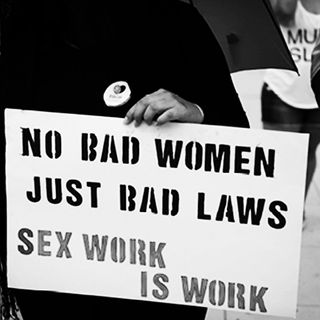
The Caroline Calloway‑Natalie Beach Saga Proves Toxic Friendships Have No Winners
This brand of female friendship is too familiar — where one’s always in the spotlight and another’s in the shadows.

Did you hear about Caroline Calloway and Natalie Beach?
Whether with palpable interest or resignation, everyone’s been talking about writer Natalie Beach’s emotional rollercoaster of an essay published in New York Magazine’s The Cut — and its subject, Caroline Calloway, an Instagram influencer previously famous for receiving, and failing to deliver, on a six-figure book deal, and scamming people who bought expensive tickets to a ‘creativity workshop’ she never ended up hosting.
Anyway, TLDR: Natalie writes of years spent being disregarded, ignored, unloved and in the shadow of her beautiful, rich, blond, Adderall-addicted friend, Caroline. Apparently, Natalie had helped to write a large chunk of Caroline’s Instagram captions, which led to Caroline’s book deal, as well as a significant chunk of Caroline’s book, which never saw the light of day. There is ridiculous behavior from Caroline, as expected by a hungry audience already familiar with her scammy history; in this version, Caroline befriends Natalie purely because Natalie comes from New Haven, home to Yale University, which had rejected Caroline; she throws away heartfelt gifts from Natalie, leaves Natalie homeless in New York and, later, stranded in Amsterdam.
But, while Caroline uses Natalie as a creative tool and treats her almost like a “child or an unpaid intern,” Natalie secretly resents Caroline for being the sort of woman who could attract a man anywhere and anytime she wants — making this whole essay and the drama associated with it a telltale sign of a co-dependant, toxic friendship, one that way too many people are familiar with.
A probable reason for why a tale of two young, privileged, New York women’s condescension and mistreatment of each other became such a random, global phenomenon is that this friendship archetype is everywhere. Ever since friendship as a concept began, so did the woman-in-spotlight/woman-in-shadow duo — with the source of light being men. It has many names, especially in cinematic tropes: lady and lady-in-waiting, popular girl and side-kick, and even hot girl and ugly BFF. Elena Ferrante’s Neapolitan Novels and the TV show Gossip Girl are prime examples of the trope. Women worldwide know and can relate to the agonizing, grating irritation of being in the shadow of their seemingly better, more beautiful friend, who they also secretly believe isn’t really worth the hype.
Related on The Swaddle:
Shine Theory Is the Antidote to the Cliché of Female Friendships
The kicker is: women also know this is toxic. A barrage of essays, videos, and social media content has informed us that no friendship needs a winner and that women must spend time raising each other up. (Yes, thank you feminism!) However, these patterns repeat — manifesting again and again — as personalities with narcissistic and self-pitying traits swallow each other whole, leading to obvious and often embarrassing disasters.
Take, for example, this paragraph, which details Natalie’s impression of Caroline’s “beauty” taking her places, interspaced with Natalie’s own traumatic experiences with men as a direct comparison, even though Natalie doesn’t directly blame Caroline for her problems:
“Ghostwriting for Caroline was like writing in a new tense — first-person beautiful — the rules of time and inevitability were just different for her. I mean, she met a long-term boyfriend at fucking Equinox. Her very first day at Cambridge, her next-door neighbor took her on a tour of campus, pointed out a weeping willow, and told her, ‘That’s where I kissed this American girl I know. Just not yet.’ (At least that’s how we wrote it.) Meanwhile, I was being treated with cruelty or indifference by the men I dated. I didn’t know how to make it better, so I made it a joke I told at my own expense to my friends over drinks and even in Caroline’s book. She never asked me to, but I used my own assault as a punchline to make her West Village boyfriend seem all the more perfect — ‘You’re dating Ted Bundy,’ [Natalie said,] ‘The apple picking comes right before the strangling. And I should know, as I myself was just sexually strangled in Bay Ridge.’“
Caroline’s ridiculous lack of care for her close friend is blatant — (“The last time we saw each other in person that winter in New York, I was introducing her to the man I’d one day marry; as an early birthday gift, she gave me already-used Glossier makeup and a check that bounced,” writes Natalie) — but somehow, so is Natalie’s clear projection of her own problems upon her silly, spiraling friend. There can’t be a clear cut ‘why didn’t she leave’ answer to this, beyond that sometimes, relationships are strange and complex.
The essay beseeches one, almost expects one, to take Natalie’s side. We’ve always supported the not-so-good-looking woman, the woman who doesn’t have it all, the woman just like us. After all, this is a woman who was both left almost homeless in New York and left alone to roam the streets of Amsterdam at night by her supposed best friend. However, there is a strange discomfort in watching someone write about her awful best friend just when said awful best friend is on-and-off in the news for being a bit of a joke. What does one make of a person’s close friend writing about the lowest moments of their life for a jeering, cruel audience?
The discomfort grows when Caroline, whose drug abuse problem is well-known, proceeded to have a complete meltdown on her Instagram — just logging which captions she wrote and which had input from Natalie. While the drama is aplenty, with metaphorical popcorn tubs overflowing at each new detail, and even a Buzzfeed quiz that helps you determine whether you are a “Caroline or a Natalie,” there needs to be pause, and clear acknowledgment, that there’s no good or bad side to be on, and that there’s much work to be done before we know how to recognize a toxic friendship and nip it in the bud. At least, before it morphs into a behemoth of a problem neither a ‘Caroline’ or a ‘Natalie’ can walk away from unscathed.
Aditi Murti is a culture writer at The Swaddle. Previously, she worked as a freelance journalist focused on gender and cities. Find her on social media @aditimurti.
Related


Study: New Relationships Are Plagued by Our Old Behavior Problems
